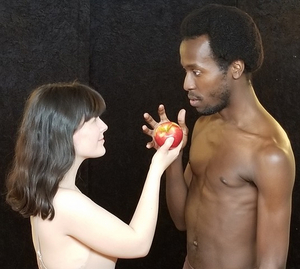Review: BACK TO THE GARDEN at Axial Theatre Follows Adam + Eve's Eviction from Eden

is Adam. (Robin Anne Joseph)
If we consider the history of the world - even for a minute - it's hard to escape the notion that humanity lives a binary existence: when it's not being its own best friend (by doing good), it is its own worst enemy (by doing harm).
Albi Gorn, an endlessly inventive playwright with a prolific sense of mischief, considers that precept for a fast-moving 100 or so minutes, in his disarmingly thought-provoking Back to the Garden.
We tag along with Adam, Eve, the Serpent, God, and others to see where Original Sin leads. (This is strictly a non-denominational treatment.)
Co-produced by Axial Theatre and GoJoClan Productions, the play runs through Sunday, Nov. 17 in Pleasantville at St. John's Episcopal Church, 8 Sunnyside Avenue 10570. (Tickets at https://backtothegarden.bpt.me/).
By dint of cleverness and craft, Mr. Gorn manages to be simultaneously serious and whimsical. Other than the First Couple, God, and the Serpent, the other seven characters are figments in fig leaves, figuratively speaking. (Bare-skinned Adam aside, their bodies are well clothed, in Flintstonian couture, by costume designer Terry Hanson.)
The newbies' names, which you won't find in Genesis, are evocative (Fecunda is pregnant); literal (Nomad is a nomad); and Biblical-sounding (Nehebeth and Shomein are wilderness folk).
THIS SHTICK STICKS
Mr. Gorn's distinctive voice vibrates with wry humor, a supple command of language, and fascination with the insoluble puzzle of our being. Mordant musings about the wonder and woes of earthly existence are leavened by playful shtick that, far from disrupting the story, puts a shine on it.
In the beginning (of the play), we are reminded that the moment Eve disobeyed God, and fell under the spell of the seductive Serpent who coerced her into eating forbidden fruit that dangled temptingly from the Tree of Knowledge, humanity lost its innocence.
What it gained is the knowledge to both create and destroy. So while a case could be made that Adam's mate became the Eve of destruction, she also was the dawn of enlightenment.
Mr. Gorn's is a post-origin story of Adam and Eve. He imagines what they saw, heard, felt, reacted to, after a none-too-pleased Jehovah (as God sometimes is called here) sends them packing from their heavenly perch in Eden.
Never once does the author assign to Adam and Eve anything other than awestruck reverence and gratitude for the deity who planted them in Paradise. When Nehebeth and Shomein describe the desolation of the desert beyond the garden gates, Eve replies, "God's infinite grace expresses itself in endless ways." And Adam's glass-half-full micro-homily is "I am certain you are enriched by your struggles."
AUTHORIAL AVATARS
The couple is soon separated in the seemingly God-forsaken wilderness beyond Eden. The ensuing action coheres as a series of vignettes, with one constant presence to remind us that evil lurks everywhere. Here, the Serpent serves as the author's avatar in raising questions that occur to deep thinkers, chiefly, "What is the point of all this?"
Where Adam and Eve dare not question God, the Serpent more than makes up for their fealty with his unyielding insolence. That's not to say the writer doesn't also use this play to speak through his God. When the writer's Yin and Yang yammer away in their ripe exchanges, it is a fascinating peek into what animates Mr. Gorn's fertile mind on matters philosophical.
In a vaudeville-flavored scene, we witness Adam being preyed upon by two blissfully ignorant cavemen suspicious of anyone not like them. They pose with their trophy for a picture, captured on a tablet (post-apple and pre-Apple).
It's in this serio-comic, off-handed way that Mr. Gorn has his say about the moral corruption of "other-ism." He's reminding us that intolerance is a timeless toxicity that connects 21st Century modernity with antediluvian crudity. Millennia later, the brand of base bigotry depicted here, tongue in cheek, continues to find sanctuary in hospitable lizard brains that undermine humankind with inhumane hate.
In another vivid tableau, we eavesdrop on Eve aghast at her first sighting of a pregnant woman, mistaking the bump for a physical affliction, as she becomes schooled on how babies enter the world.
Throughout these encounters, there are worldly lessons dispensed. One of my favorites: "We take a constructive idea and adapt it for destructive purposes. Wait until they see what they do with fire or the wheel or the atom...or religion."
Theater pieces like Back to the Garden have little need for large physical scale to make their mark. This black-box production hath many charms that are of a piece with its intimate scale.
HEAVENLY DIRECTING
The tightly focused acting and efficient, purposeful stage movement is a hallmark of director Robin Anne Joseph (whom I've worked for on stage). She makes optimal use of every inch of the floor space where the play is performed.
The singular, simple set is functional enough to accommodate the Garden of Eden at ground level and an elevated platform that rises above it, where God reigns from on high.
Between scenes, we're serenaded with a choice selection of oldies but goodies, thematically tied to the action that follows. Before we meet the Serpent, we hear "Sweet Talkin' Guy" by The Chiffons, and so on.
As a lifelong sucker for biblical epics, I got a big kick hearing the title music from Cecil B. DeMille's The Ten Commandments playing under the pre-curtain housekeeping announcement ("Thou shalt not take pictures..."). Kudos to sound designer Jim Simonson for that fun flourish.
INSPIRATIONAL CASTING
The casting is spot on, starting with the believably bi-racial Adam and Eve of Torian Brackett and Maddy Murphy. Costumed in a way that is totally tasteful, yet also conveys a credible state of undress, these actors are unabashed in their wonderment -- ingratiatingly curious and naive about the complicated world unfolding before them.
Dawn Brown-Berenson's female God of color is a formidable yet level-headed presence, balancing benevolence and gravitas with balletic grace. It's another instance of this production's inspired casting by GoJo Clan. The beatific lighting effect on Her visage as She surveys her kingdom is the wonderful work of lighting designer Ro-z Edelston.
Tangling with God at the nether end of the moral spectrum is that sneaky snake in the grass, who puckishly calls her "Addie" (short for Adonai).
As The Serpent, Anthony Barresi, Jr. pops up continuously in a gamut of guises -- from a bent-over elderly woman to a voodoo-masked shaman to his native self -- always at the ready with a wisecrack and a manipulative scheme to draw innocents into his den of iniquity.
What distinguishes each of his characters is Mr. Barresi's compelling stage presence. He brings to each of his scenes a swagger and relish for the roles that's just plain fun to watch.
The rest of the cast is uniformly commendable in creating characters of empathy, substance and, often, amusement: Michael E. Boyle, Jr. and Marilyn Collazo are Shomein and Nehebeth, desperate for a better life; Stavros Adamides and Robert Ansbro are cavemen Wayfare and Nomad, blundering their way through subsistence; Jennifer Berry as Fecunda; and the indomitable Gail Greenstein, as ever, is a hoot as The Guardian (who could have been aptly named Wrong-way Corrigan).
It all boils down to an extra-ecumenical message of fellowship and good will toward not only each other, but especially toward whomever might qualify as "the other."
Such unity of purpose in a world as disparate as ours may seem a hopeless crusade, but, absent hope, we may as well prematurely extinguish our finite existence.
In Act I, God tells The Serpent, "Humanity is pointless without God."
The Serpent, not about to be one-upped, returns serve, saying, "God is impossible without humanity."
Hmm.
Go figure.
Better yet, go see Back to the Garden.
There will be a test.
Every day.
It's called Life.
[The author of this review is on the board of Axial Theatre and is a marketing consultant for GoJo Clan Productions]
AXIAL THEATRE-GOJO CLAN PRODUCTION TEAM
Producers: Catherine Banks and Stephen Palgon
Production Manager: Mary Cate Mangum
Production Stage Manager: Albi Gorn
Assistant Stage Manager: Ginny Reynolds
Lighting Designer: Ro-z Edelston
Sound Designer: Jim Simonson
Costume Designer: Terry Hanson
Light Board Operators: Ro-z Edelston and Destiny Mosley
Videos
